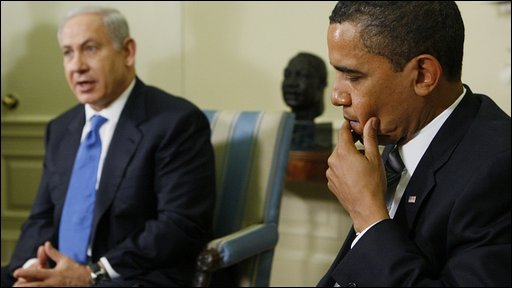![]()
Thu, Oct 14, 2010 | The Rubin Report | By Barry Rubin

Is Barack Obama capable of learning from experience or is he so ideological and wrapped up in himself as to be pretty impervious to advice or the external world.
Israeli Assessments of Obama Are Far More Pessimistic Than You Know
While I have my own point of view (which I will come to in a few paragraphs) I also think you should know what sophisticated analysts are saying in Israel about the current U.S. government when they aren’t speaking in public. They are extremely concerned over what will happen in 2011.
According to these analyses, Obama is so determined to “solve” the Israel-Palestinian conflict–due to his ideology–and is so full of the belief that he can do so–due to his excessive self-confidence plus inexperience–that he will make this virtually the highest foreign policy priority during his term’s remaining two years. This will be done by pressuring Israel, by backing a unilateral Palestinian independence declaration (without a deal with Israel), or perhaps by trying to impose a plan of his own.
This approach is focused on readings of Obama’s personality and world view, assuming he will be little affected by countervailing factors. Factors that would inhibit such an obsessive pursuit of a “solution” at any cost include:
The desire for a second term; congressional pressure against such a policy; strong opposition by public opinion; the advice of his aides; evidence that such a strategy would be a disaster; lack of cooperation by the Palestinians; and the presence of other pressing issues, perhaps major crises. In other words, this would be a single-minded, Captain Ahab (Moby Dick reference) obsession disregarding any other consideration.
I find this rather hard to believe and would suggest that there is already evidence such an outcome is unlikely. For example, the administration discovered that its focus on settlements backfired and that both the Palestinians as well as Arab states are very uncooperative. Failures have made the administration look silly on several occasions. Losses in the November elections would increase the strong desire within the Democratic Party to avoiding actions that would increase its electoral problems. Pursuing such a course is perhaps the foreign policy move most likely to cost Obama the 2012 election–which will of course be determined mainly by domestic issues–not only because of Jewish but also due to the views of many non-Jewish voters. I could go on at length.
The question comes down to whether Obama–who, let’s face it, is still more of a mystery than any previous U.S. president–is in any way a normal politician. Is he capable of learning from experience or is he so ideological and wrapped up in himself as to be pretty impervious to advice or the external world. It’s pretty horrifying to realize that we cannot assume the answers to these queries.
I would suggest that this administration is less responsive to reality and less willing to learn from experience than most of its predecessors. Yet is this government–with all the advisors, appointed officials, members of Congress, and party bureaucrats–really so lacking in a sense of self-preservation?
One thing’s for sure, we’re going to find out. And if the evidence is going against my view I won’t hesitate to change my opinion and say so in the loudest and clearest way.
And read this companion article I’ve written very carefully, then click on the link and read what the Qatari author wrote. You may think that Israel and the Arab states have totally opposed views. That’s not true. Drop out Syria and Libya, and you’ll find that Arab fears are equally great regarding whether the U.S. government will defend them against the Iran-Syria-Hizballah-Hamas axis and the other revolutionary Islamist movements.
The more moderate Arabic-speaking governments are also pushing for a more realistic U.S. policy. I think in the end all of these forces will succeed, albeit to a far lesser extent than should happen.
About the author,
Barry Rubin is director of the Global Research in International Affairs (GLORIA) Center and editor of the Middle East Review of International Affairs (MERIA) Journal. His latest books are The Israel-Arab Reader (seventh edition), The Long War for Freedom: The Arab Struggle for Democracy in the Middle East (Wiley), and The Truth About Syria (Palgrave-Macmillan). For the website of the GLORIA Center go here and for his blog, Rubin Reports, go here.



 RSS
RSS










Israeli Assessments of Obama Are Far More Pessimistic Than You Know | #israel #us #obama http://j.mp/cea8xf
RT @CrethiPlethi: Israeli Assessments of Obama Are Far More Pessimistic Than You Know | #israel #us #obama http://j.mp/cea8xf